ali • xvii • she/her • infpcollege freshman{about me} ~ main: niamzies ~ {links}
Don't wanna be here? Send us removal request.
Photo
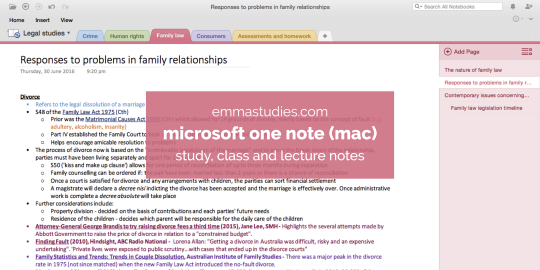


Microsoft OneNote tutorial for study, class and lecture by emmastudies
Hello! I have had numerous people message me about how I structure my notes for OneNote so I thought I would put together a tutorial! Above is a small run down of the program and my little two cents on each feature. But now I’m going to go into a little more detail to help anyone who is looking for somewhere to type their notes. Through I’ll suggest my ideas on how to use OneNote for different reasons including study notes, class notes and lecture/tutorial notes.
Set up and use:
Start by downloading OneNote from the App Store or from their website if you’re using a PC. It is free!!! I would definitely recommend downloading the mobile or tablet app as well.
Sign in with an Outlook account and begin making your notebooks. For high school I would suggest a new notebook for each class. For university, I had one notebook for the entire semester. As I go into my second semester I’ll make a new one, and so one. For study notes, it is up to you. You could either make one notebook for all your study notes and use sections to divide per subject or make a new notebook for each subject again. Or simply and a new section in the existing notebook. Notebooks are linked to OneDrive meaning you can close the notebook and reopen it at any time. They’re automatically saved too, so you can edit on your phone and when you use your computer it is updated!
Start creating sections. These act as dividers so depending how you have structured your notebook, make them for either each topic of your subject (high school) or each of your classes/subjects (university). For my high school class/study notes I made a new section for each new topic and for university I have one per subject. As you can see in the photoset; my notebook was legal studies (subject) and each section was for a topic (crime, human rights, family, consumers, assessments and homework).
Create your pages for each time you have class. Add the title of what you’re doing and start typing your notes. For my lectures I usually just name them “lecture 1”, “lecture 2” because I’m lazy, however for study notes I would use each subheading of the topic in the syllabus. If you’re wanting to understand my headings and subheadings completely I suggest checking out the legal studies syllabus that I created the above notes too (you can see it here on page 26).
Time for decoration and colour coding. Usually as I’m typing I bold or underline and colour code but you can always go back and do it as a revision method. This also gives you a chance to add any extra information you find! You can see an explanation of my colour code in the final image of the photoset. I found colour coding and formatting super helpful when I was studying for my HSC final exams!
Printing time! When I had finished my study notes (or class notes) I would print them so I had a physical copy to highlight and annotate. Here is where it gets a little fiddly. To print on one A4 size piece of paper without cutting off half your text, you need to shrink the size of the text box. This is what you might see - with half the text cut off. I would say reduce it to about half the original size - you can usually see on print preview how close it is to the edge. After you have made the textbox thinner, it should look like this. Another tip is printing using one sheet for two or more pages. This helps to reduce the amount of paper you’re using. On the print settings look for “pages per sheet” and change it to the number of pages you want (obviously the more pages, the smaller the font). It should look something like this (I’m not 100% sure if every computer or printer has this option, but for reference I use an Epson printer).
That is pretty much it for how I use OneNote for my all my different types of notes! It is very simple once you’ve organised everything! I would 100% recommend this program. We were advised to use it in year 9 when we received laptops from the government and I’ve not stopped using it. Althought there are some different between the Mac and PC versions, the main elements are the same. However you can check out this post by @vanesastudies which is for the PC version. I hope this tutorial was helpful. If there is anything I’ve missed out, drop me an ask. Thank you for reading! x
16K notes
·
View notes
Photo

How I structure my OneNote lecture notes! This is a lecture from a little while ago because it’s a good example. I really like using this program because it works across devices using the cloud, I find the notes look better and are easier to manipulate than word, and it makes it very easy to organise myself. I use the split screen function during lectures so I can copy the slides and add extra information from the lecturer.
98 notes
·
View notes
Note
Hi! My school has all students doing all of our work on one note & any notes as well. I just don't understand how to organize it. Any tips to organize note taking on one one? Thanks xx Studyblr: letustudy
Hello! Thanks for the question!

How to Organize Note Taking on OneNote
“OneNote is meant to be used as a physical notebook replacement. The program is most effective when you organize your notebooks like you would in the real world, that is, with individual notebooks for each subject/topic, separate sections for each sub-topic, and separate page for each note or groups of similar notes.
Most beginners tend to be very conservative with notebook and section creation. Don’t be; you don’t stand to lose anything save a few megabytes of space for each new notebook. Create as many notes, pages, sections and notebooks as you like – it’ll make organization that much easier.
For example, if you are a college student, you can make a new notebook for each class you take in a semester. You can then make separate sections for each broad topic, and add pages of notes for each day of the class.”
[from this very good OneNote tutorial]
some cool features of OneNote are:
audio/video notes
syncing notebooks across all devices
saving to the cloud
automatic sourcing when copy-pasting from the web
making to-do lists
tagging
“clipping” web pages to view it later
sending emails to OneNote to be automatically put into your notebook
sharing notebooks/pages for real-time collaboration
perform simple math equations
retrieve text from images
use on computer/laptop/tablet/phone
resources:
10 OneNote tips
7 more OneNote tips
OneNote tutorial
some hidden OneNote features
I really hope that this helped you to get the basics of organizing and to show you some of the really cool features that the software has!
-runningstartstudent
1K notes
·
View notes
Link
Hey everyone, if you’re looking for Japanese textbooks but can’t afford them, here’s a Google Drive folder full of PDFs of textbooks like Genki, Tobira, Japanese for Busy People, Integrated Approach to Intermediate Japanese, and even the Dictionary of Japanese Grammar series.
3K notes
·
View notes
Note
hello! do you know any reliable websites for free pdf textbooks? i am in dire need for some reliable resources :'(
Try Bartleby, BookYards, The Online Books Page, Project Gutenberg, Textbook Revolution, BookBoon. Also, libraries often have access to ebooks and journals.
Edit: someone who reblogged this post pointed out the Libgen site. I don’t know about how legal this is but it seems to have an extensive collection. Use at your own risk I guess?
563 notes
·
View notes
Photo

Hi guys! Today I’m going to share with you some of the apps and websites I have come across/use myself. I divided them into categories!
All apps are free unless stated otherwise. I’ve never paid for an app in my life!! Anything marked with a * is a favorite of mine.
Calendar/Organization:
* Plan: amazing calendar app; syncs with Google Calendar; easy to use (iOS app; website); will probably make a whole post about this app
My Study Life: calendar app that helps with organizing your time (iOS; Android; website)
Wunderlist: list making; you can share tasks, etc; access literally from any device, even Kindle
Sunrise Calendar (iOS; Android; Mac; website)
Google Calendar
Productivity/Avoiding Procrastination:
Forest: not free, see free Chrome extension below (iOS; Android)
FocusNow: similar to Forest, but free (iOS; Android)
Pomodrone (iOS)
Pomodoro Time (iOS)
ClearFocus (Pomodoro timer for Android)
Self Control (Mac)
Cold Turkey (Windows)
Chrome extensions:
Some of these are mentioned in other categories
* Momentum
* Embark
Currently
* Lanes
* Forest
My Study Life
* Noisli
StayFocusd
Language learning:
⇢ Multiple languages
* Duolingo: most major languages (iOS; Android; Windows Phone;website)
TinyCards: flashcards by Duolingo (iOS)
Duolingo test center: for English Language Certification; you can actually pay for a certificate; reviews say it’s very difficult (iOS)
* Memrise: most major languages; teaches programming languages (iOS; Android; website)
Conjuguemos: a few (mostly Romance) languages; teaches Latin verbs
Lingoda (paid): English, German, French, Spanish
L-Ceps: tons of different major languages; teaches Hindi, Malay, Burmese, Tagalog and Thai
Hello Talk: over 100 languages; learn with native speakers, and teach them your own language (iOS & Android)
Multilingual Books: a lot of resources for learning American Native Languages
iTalki (paid): literally any language you can think of; I’ll probably apply to be a teacher there soon
Radio Guide: listen to radio stations from tons of different countries
Babbel (paid): 14 major languages
* Forvo: a pronunciation dictionary for TOOOONS of languages
⇢ Specific languages (alphabetical order)
Arabic
Arabic alphabet
Learn Arabic Online
Holy Quran in Arabic
Al-Arab newspaper
Cherokee
Rjholton
French
Bonjour
About French
@awesomefrench , a fellow blogger who teaches French
Watch the movie Paulette (2012), it’s absolutely hilarious. French is a bit tricky, so watch it with subtitles (in French, preferably)
France24 newspaper
German
Deutsch-Lernen
Learn German Easily
Spiegel newspaper
Hindi
Learning Hindi: link for beginners
Dainik Bhaskar newspaper
Italian
One Word Italiano
16 free Italian lessons
La grammatica italiana
Corriere della sera newspaper
Japanese
Guide to Japanese
Free Japanese lessons
Japanese-Online
Asahi newspaper
Korean
Learn-Korean
* Talk To Me In Korean (iOS & Android)
Korea Herald newspaper
Portuguese
Oneness
BBC UK
Learn Portuguese with Rafa
Diário de Notícias newspaper
Russian
Learn Russian
Russian alphabet
Izvestia newspaper
Spanish
About Spanish
Watch the movie Chico y Rita (2010), it’s great and easy to understand! (I watched it in class)
El País newspaper
⇢ Sign languages
American Sign Language:
LifePrint
British Sign Language
MobileSign
School of Sign Language
Deaf Work Mate
Finger Spell
French Sign Language
Dico LSF (dictionnaire)
Web LSF Lexique
Terminologie scolaire
WikiSign
Multidico (lexique)
German Sign Language
WikiSign
Spanish Sign Language
Lenguaje de signos (libro)
Curso online gratis
Català y Español: WikiSign
Portuguese Sign Language
Escola Virtual LGP (inclui os básicos; só temos que criar conta)
Note taking:
Evernote (iOS; Android; website)
* OneNote (iOS; Android; Mac; PC; website)
Studying:
Quizlet: create/use other people’s flashcards (iOS;
* Khan Academy: various subjects; basically a team of amazing teachers (iOS; Android; Windows 8/10; website)
* Crash Course: another team of amazing teachers; partners with Khan Academy; it’s a Youtube channel; see their playlists for different subjects
Shmoop (paid): courses, test preparation and learning guides
Brightstorm (paid): similar to Shmoop
Background noise:
* Noisli: you can choose between productivity and relaxation (apps aren’t free, but the Chrome extension is: iOS; Android; website)
* Coffitivity: you can choose between different ambiences (iOS; Android; website)
A Soft Murmur (Android; website)
Fonts:
Dafont
1001Fonts
* FontSquirrel
* Fount: for when you want to know what font someone is using on their blog/website
Stationery shopping:
Mochi Things
Jetpens
* AliExpress: ships from China; super cheap stuff, I mostly buy washi tape and stickers but they have everything there; make sure to filter your search by selecting free shipping and price low to high (they have the same exact products for completely different prices, depending on the seller)
Alright guys, that’s all the apps, websites and tools I have to share with you. I hope you find this useful!
Let me know if you have any requests for posts. Check out my previous masterposts:
Back to School: general tips and advice
All about food: different meals and snacks for students
8K notes
·
View notes
Photo
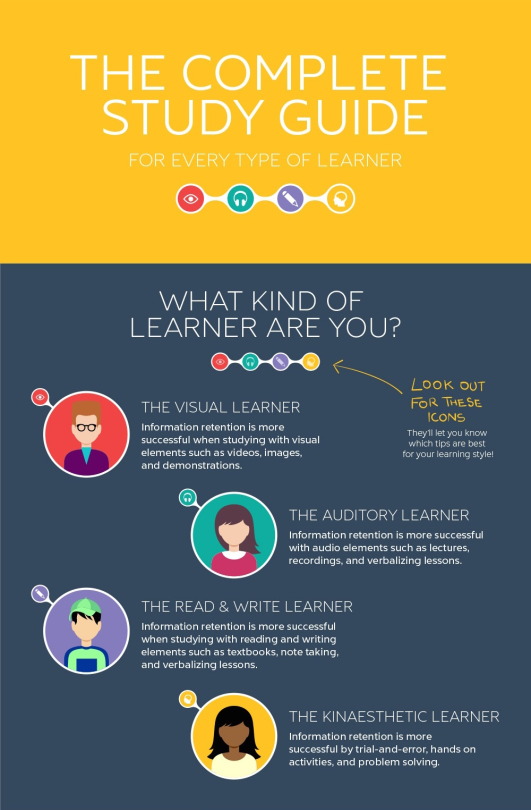


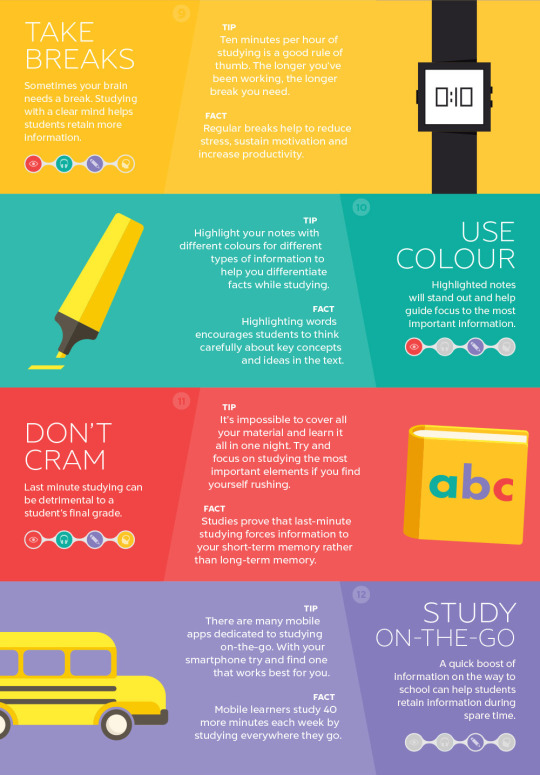


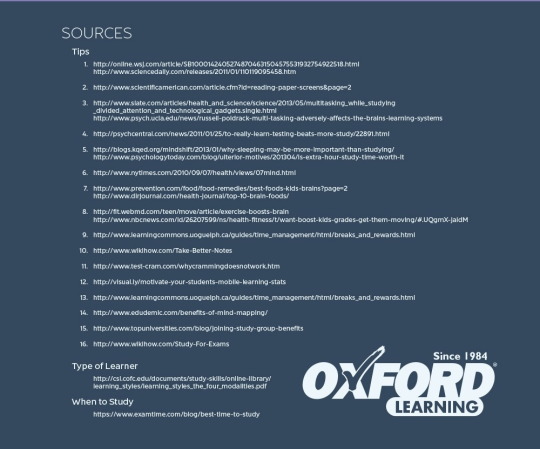
An Infographic Of Useful Tips For All Types Of Learners
24K notes
·
View notes
Text
10 Angry College Tips For Incoming Freshmen
(I finished my freshman year this spring with a 4.0 GPA, an off-campus research internship, and three professors contacting me suggesting that I apply for a fulbright scholarship. These tips aren’t coming out of my ass.)
1. LISTEN TO ME WHEN I SAY THIS: YOU DO NOT NEED TO “GET INVOLVED” IN STUPID CLUBS IF YOU DON’T ENJOY THEM. Hear “get involved! :)” for the 1000th time and just barf in your mouth a little and move on. If you work hard and get good grades, and socialize with people on campus when you have free time (it comes more naturally than you think) YOU WILL. BE. FINE. Actually better than fine. You’ll have time to get a real job/internship, which by the way, is what the real world wants to see you prioritizing. Moral of the story: Only join clubs if they help your personality thrive and feel healthy. Don’t do them because you feel pressured.
2. DON’T TAKE SHIT FROM A N Y O N E. I know you’re trying to fit in and take the stance of trying to make everyone happy to make sure you’ll have plenty of friends. But you have to realize that you literally just met these people, and they just met you. If they create an uncomfortable environment for you that makes college harder to cope with, get them the fuck out of your life. Ain’t nobody got time for people’s high school-ass drama.
3. SKIP YOUR CLASSES SOMETIMES. If you really have your shit together, it won’t matter. Your school will say the amount of skips you can get away with before it harms your grade. Use. Them.
4. BECOME THE MASTER OF WRITING ESSAYS IN ONE NIGHT. You will have to. I’m telling you right the fuck now. And you can get an A, if you work your lil ass off. I’ve done it many times.
5. DON’T CARE FOR EVEN 1 SECOND WHAT OTHER PEOPLE THINK OF YOU. If you wanna wear sweats and no makeup, do it. If you want to dress up and take time to put on makeup, do it. If you want to stay away from partying, do it. If you want to party, have a good ass time. If anyone has enough time to judge you, they need to be studying harder or getting a hobby. Make yourself comfortable and happy as fuck and enjoy your time in college worry-free.
6. BE THE ASSHOLE WITH A TABLET OR LAPTOP IN LECTURE. You won’t have time to copy it all down. You’ll be miserable. Just trust me. I know studies say its more effective to write stuff down for memory, but, write them out later or something. Learned that one the hard way.
7. DON’T REWRITE YOUR NOTES IF IT DOESN’T HELP YOU STUDY. If you know doing that doesn’t help you memorize, don’t do it, period. Or, if you have a collossal asston of notes (like I did) it isn’t even worth rewriting them all in the first place. I’ve fallen down that hole and lost motivation and time. Just reread them or make flashcards or whatever. Study for effectiveness, not aesthetic.
8. BE PREPARED FOR LAB TO GO THE “WHOLE TIME.” Yah, you’re gonna see 3 hours on that brand-shiny-new schedule of yours and be like there’s no way it’ll go that long, right? LOL about that. Just mentally brace yourself. Eat and drink beforehand for the love of god we don’t need hangry people handling chemicals.
9. COMMUTING DOESN’T MAKE YOU A LONER. Just. No. If you live close to campus, are comfortable with commuting, and know you’ll save yourself MAJOR debt by doing it, do it and don’t feel a fucking ounce of guilt about it. It’ll be some early mornings, but your fresh out of college broke ass will thank you, and you’ll use your time more effectively. (Plus you get a non grimy shower like??)
10. LOVE YOUR NEW FINE ASS SELF. College is a fresh start. Put energy into who you have always wanted to be. And don’t compromise that out of social anxiety and embarrassment. You’ll be happy and thank yourself if you step out of your comfort zone to be the person you’ve always had in mind.
56K notes
·
View notes
Text
what I wish someone told me going into my freshman year of college
You and your roommate might not get along.
Just because you woke up early every day in high school doesn’t mean you will be able to in college.
Conversely, you might just realize you are a morning person in college.
You should learn to examine your personal biases. Ask yourself why you have a certain opinion.
There are plenty of students who have taken 17, 18, 19 hour course loads and they have been successful; however, it may not be financially feasible.
Searching for scholarships doesn’t stop when you get to college. Keep looking for them and applying for them. Create a separate email account to receive and correspond to scholarship emails.
Don’t put off visiting your academic advisor. Mine absolutely saved me when I was going through the lowest point in my life.
Let your mom/dad/parental guardian (if applicable) make your bed on move-in day.
Get involved, but only if you want to. Student organizations in college are much more time-consuming, so be certain that it is something you really want to do.
Have fun. You don’t have to go out every single weekend. But go get coffee or study with a friend. Have some sort of interaction with others.
Getting a job really eased my financial burdens and I made friends, and established references. Having money just feels good.
Wash your face. Keep make up wipes close to your bed for nights when you are just too tired to go through an elaborate skin care routine.
Communal showers suck, but we all have to endure them. I promise you will get used to it. But you gotta bathe, friend.
Be honest with your support system. Many times, those closest to us would help us in a heartbeat, but they never knew we needed help in the first place.
Utilize services your tuition covers. These include, but are not limited to, tutoring, legal services, medical services, etc.
Sit in the front row. Just do it. Seriously. You will be less inclined to get on your phone/not pay attention to lecture/discussion material if the material is two feet away from you. You can also see better on those days when you forget glasses, or run out of contacts.
Your MWF life does not know your T/TR life. You can totally hit those clothes with some febreeze and wear them on heavy rotation.
Speaking of clothes, everyone washes clothes on Sundays. It’s a fact.
You really don’t need to bring all of your clothes, expensive jewelry, trophies from that time you did soccer in 2nd grade, etc. to your dorm. Just enough clothes to fit in your drawers/closet for all seasons, and a couple sentimental items to remind you of home.
Save the boxes you use to move into your dorm/apartment. You will need them come move out.
Live and die by the syllabi, but know that professors will change things up randomly. They will also announce things in class that are not on the syllabus at random.
Do invest in some good plates and Tupperware.
Drink water.
The freshman 15 is real and it is coming for you. But it’s okay. You’re still awesome.
Parking in college is universally limited and unforgiving. Be mindful of this.
Many retailers will have sales on microwaves and mini fridges when fall comes around. Invest in them.
Storage containers are a must.
Respect quiet hours.
If you will be living on campus, and your campus is dry - RESPECT THAT. Seriously, it’s such a dumb mistake to make. I have friends who started out on probation because they decided to drink in their dorms their freshman year.
Get a power strip. Or three.
There’s no dress code in college. So you can totally wear that crop top. But be mindful that those surrounding you are potential professional connections. A lot of college is networking.
But, in all honesty, no one really cares what you are wearing.
You are an adult now, so setting boundaries is necessary.
Don’t stay in that toxic relationship.
Keep in touch with your friends/family from back home.
Do ask your professors questions in office hours, during class (if able to), or via email.
Use protection.
Stand up for yourself, what you believe in, and others.
Get the number of at least one person in each class during syllabus week.
Expect to stay the entire 2-4 hours of your lab.
Be respectful of your roommate’s space.
Be respectful of other’s differing opinions in Blackboard discussions.
Be a point whore. Do the extra credit. Do it.
Remember that college is a new beginning.
Realize that grades do not define your intelligence.
Realize that sometimes we fail classes, but it does not mean that we are not “smart enough.”
Know that college is not for everyone.
It’s okay to take a couple semesters off to better yourself. I did, and I am so thankful that I made that decision.
Buy your textbooks and access codes and lab manuals as early as you can.
Use a planner!!!!!!
Mental health is just as important as physical health.
Remember that college is not supposed to be the best years of your life. College is meant to set you up for the best years of your life.
26K notes
·
View notes
Note
Hi! Do you have any must-haves for college? Like planning and stuff? thanks xx
Hey! Here are the things I’d recommend:
a backpack - the best solution for carrying around a lot of things! I tried going with a shoulder bag on my first day of university and it was the worst thing ever!!!! Never again will I do that to myself! Get yourself a sturdy backpack with strong straps! You, your back and your shoulders will thank me later! I use a 13″ laptop version Fjallraven Kanken, it is really awesome. Very practical, comfy and waterproof. My only dislike is how the zips go so far around the whole bag. I always get nervous that someone behind me will unzip it and steal my purse or whatever it sitting at the bottom.
a 4 ring binder (and plastic sleeves) - any brand will do really! I would recommend getting one per subjects since it saves running out of space if you try to fit things into one. It is also sometimes cheaper to purchase several at once! This stay at home though.
notebooks - I use a single Arc Notebook for all my subjects and love it. I find it easier to have a single notebook with dividers, rather than carrying several individual books. However, any notebook(s) would be fine. You can decide if you’d like spiral, A4 or A5, etc.
OR a tablet for digital notetaking - this depends on how you plan to do your notes but I’ve recently been using our family iPad Pro for university and absolutely love it. It is so convenient, easy to use, and fun! Writing with the pencil is so smooth. I can change colours, mistakes, placement so fast. I think it has helped me be much more productive than any other semester! Here are some digital things I have on my Etsy!
planner - this can be any you like or even digital version! I tend to go for smaller planner if I’m actually taking it to uni. Here is are some recommendations. Here is a review on the Mossery Co planner. Here is my 2017 bullet journal. Here is a detailed pros and cons list of a planner vs bullet journal. There is also my printable or digital 2018 student planner or 2018 weekly planner :-)
pens - I would recommend getting a pack with a selection of colours. I usually recommend the Staedtler 432 pens since they’re well priced, easily accessible, come in packs and don’t smudge. I don’t see the point in buying huuuuge packs with a million pens but 10 to 12 is more than enough. I really like the Zebra Sarasa though - they’re so nice but are gel pens! Other pens I like are the Pilot G2 and Juice, Staedtler Triplus Fineliners, Muji Gel Pens. Obviously, you don’t need a million different packs! To be super simple, I’d say the Zebra Sarasa are a great start. Here is a more detailed comparison though!
highlighters - I use the cool, warm and light packs of the Zebra Mildliners. I’ve used the Stabilo Swing Cool in the past and they were good! I think having a selection that matches your pens is so helpful when you’ve organised a colour code.
pencil case - I only take a few pens to uni so my pencil is only small. I don’t think it’s necessary to take a huge pencil case so just any will be okay! I have one from Muji and one from Emma Bridgewater. The Muji one irritates me though because when it’s not full, it makes so much noise..
etc - this goes for post-it notes, page flags, etc! I love to-do list pads and post-it notes to help keep me organised!
Additionally, here are a few printables that might help you get/stay organised:
2018 student planner - includes loads of student-related printables (study, finance, etc) and undated daily, weekly and monthly planners.
ultimate student organiser - 47 pages of printables to organise your upcoming semester! Covers things like your individual classes, reading schedule, essay planner, etc.
college packing list - not necessary if you’re still living at home, but if you’re moving into a dorm this might be beneficial for making sure you remember everything!
curve of forgetting planner - a simple way to mark off topics in each subject and make sure you’re revising them regularly.
grade and assessment planner - it is always important to track how your grades are doing and this is a quick way to do so. Also, should make find problem areas relatively simple!!
student financial planner - an easy way to monitor your spending, set a budget and reach savings goals!
student reading journal - great if you have a lot of required readings each week!
there are loads more though! I also have lots of things for GoodNotes is you do have an iPad.
Here are some additional links that could help:
advice for the first day
things (personal, academic, etc) to do every week
10 small ways to improve your productivity
10 small ways to improve your motivation to study
dealing with stress
how to improve your sleep schedule
how to improve group assessments/projects
dealing with competitive people
how I stay motivated
how to study during the semester
I hope this helps and good luck! xx
2K notes
·
View notes
Text
Ghibli Music for Studying

(All link to YouTube)
24 minutes - harp music
30 minutes - cello music
36 minutes - slow compilation
1 hour 32 minutes - slow piano, some ghibli themes.
1 hour 33 minutes - pace varies, good for cleaning the house too.
1 hour 36 minutes - slow piano, sometimes a bit more upbeat.
1 hour 49 minutes - Ghibli music with fire crackling in the background
1 hour 52 minutes - slow piano.
2 hours 22 minutes - slow piano.
3 hours 32 minutes - Ghibli Jazz (cover)
+A different post on Ghibli playlists <3
9K notes
·
View notes
Photo

soaking up the sunbeams at my desk this morning ☀️
12K notes
·
View notes
Text
SCHOOL CHEAT SHEET 2
back to school masterlist
tips for exams
ultimate back to school tips
tips for the new school year
4 legal ways to get free textbooks
essential productivity apps
actual first time college advice | tips for lectures | how to take lecture notes
study breaks | studying hacks
bet your teachers never taught you this
how to take organised notes
text book tips
tips to make school life easier
how to do cover letters
studying a foreign language tips
dyslexia friendly fonts
writing about royal characters
language learning sites
tips for effective studying
travel cheap
23 editing tips
useful apps for students
words to describe someone’s voice
Joss Whedon’s writing tips | writing references
50 things to ask your character before you start writing
stop using google.com to search information
life hacks for school
how to write an essay
8 basics of creative writing | fantasy guide | songs for creating stuff
for crime writers
dear writers
a high school teacher’s list of 100 wisest words
confused what to underline, italicize and when to use quotation marks?
feeling anxious for school?
make pretty banners | another one | and another one | one more | okay last one i promise
how to study like a harvard student
how to do pretty lettering | how to make your notes pretty | handwriting and note taking | colour code notes | how to maintain good notes | take digital notes
using one note to take notes | another one
how to get shit done
things i wish people had told me when i was a freshman
handwriting reference
in class notes reference
20 things I found out about studying last year | things to do remember when studying
revising for maths
abbreviations for note taking | 2
12 things i learnt during 12 years of school
transition words
how to study from textbooks
how to make history timelines
what to do if you fail a class
backpack essentials
studying 101: how to stay focused, motivated, and on track.
secret study tips | top tips for studying in college
ultimate studyblr guide
hey, school’s hard
other cheat sheets
20K notes
·
View notes
Text
Advice for College Freshman
Hey guys, I’ve gotten a number of questions asking for advice about university/college and since I’ve got a close friend getting ready to enter university as well, I thought I might write up a post with some of my own university advice, tips, and tricks! Lecture Advice:
Don’t enrol in 8am classes if you have a choice - unless you’re a morning person then go for it, but otherwise you might end up skipping your lectures for an extra hour of sleep.
Don’t skip your lectures - the more lectures you skip then the easier it is to fall behind and get into the habit of not going. It’s really important to attend your lectures and develop a personal relationship with your lecturers.
Don’t skip your lecture to catch up - if you’re falling behind then you really should dedicate a day to get all caught up because if you keep skipping your lectures to catch up, then you’re going to be behind all semester long.
Get to know your lecturers and tutors - getting to know them more personally by getting involved in your tutorials and asking questions when you’re not sure about something. If they can see that you’ve been actively trying to participate then they’ll be a lot happier to help you out when you need it. Don’t be afraid to send them an email or meet with them during their office hours.
Attend all your tutorials/workshops - I often found that my final exams were based off of the questions and answers from my workshops. So make sure to take careful notes and try to answer all the questions in your workshops, if so studying for your final exams should be a breeze!
Make friends with the people in your lectures - I made friends with people studying my degree because we had a lot of classes together and we always shared notes from our lectures and studied together for all our quizzes and final exams!
Create a shared Google Document to share notes - my friends and I had a shared google document that everyone could access and each week we uploaded our notes from class to share with each other. This ensured that we never missed important information because someone would always catch it.
Attend PASS if you need help - some universities offer PASS (peer assisted study sessions) sessions where students come together to revise content and they’re often led by an undergrad student who successfully completed the course the previous year.
Essay/Assignment Advice:
Find your resources / literature before writing your essays - if you find relevant information and quotes first, then it makes knowing what to write about a lot easier. If you need help finding scholarly articles try Google Scholar!
Try to credit your sources as you go - I found it a lot easier referencing my sources in my reference list as I used them, rather than dedicating half an hour to an hour after I had finished my essay to go back, find all my sources, and then reference them properly.
Referencing Tool - my university has a really helpful referencing tool that tells you how to reference properly using the different referencing styles if you need help!
Find the motivation to stop procrastinating - If you’re struggling to find the motivation to do your work I’ve made a separate post about how to stop procrastinating!
Can’t access certain journal articles? - this website has been my savior for the past four years! It allows me to access articles that I would otherwise have to pay for, for free!
Don’t leave your assessments until the last minute - if your essay is due at midnight try to finish it much earlier so that you’re in the right frame of mind to edit and submit it! I always tried to finish my assignments a couple days in advance so that I had a lot of time to edit them.
Write down your assignment due dates somewhere you can see - I once forgot to submit a 5% quiz because I completely forgot all about it. Since then I wrote down every single assignment due date on my wall calendar and in my assignment tracker from @thearialligraphyproject and I never forgot again!
Personal Advice:
Don’t pull allnighters - try to get as much sleep as possible because you’re pretty much always going to be tired, so pulling allnighters and then skipping your lectures the next day is never a good idea.
Join clubs - try to find a club that interests you or is relevant to your degree! They’re a great place to meet people, make new friends, and to get you out of the house or your dorm room! I joined the Japan Club and met lots of Japanese people to practice Japanese with and made friends with a lot of domestic students as well!
Go to uni events - try going to as many events as you possibly can without falling behind in your work! It’s important to socialise and get out of your room in order to destress. I ended up doing activities I never thought I would have; trips to theme parks, rock climbing, ice skating, etc. and they were all free!
Don’t study at university unless YOU want to - you shouldn’t go to university unless you’re studying something for yourself because it is a lot of work and effort, so if you’re going just to make your parents happier you won’t be happy so make sure you’re going for the right reasons! If you find that you don’t enjoy your degree then you should look at what else your uni has to offer, you might find another degree that suits you better!
Take your ID with you everywhere - there were so many free food events and activities at my campus and all you had to do was show your ID! So make sure you always have it on you!
Go see the free counselor - most universities have a free counselor or therapist on campus that you can talk to if you’re struggling or just want someone to talk to, so if you feel like you need it schedule an appointment!
Not sure what to do after your degree? - go see the career adviser! When I wasn’t sure what to do when my degree ended I went to see the career adviser on my campus and she gave me a list of suggestions and steps to take that really helped me out!
Do your chores - make your bed, clean your room, go grocery shopping, cook your meals, take out the trash! You need to remember to look after yourself mentally and physically while you’re studying. It always helped me when my environment was clean and organised too.
Do you have any good advice that you want to share too?
472 notes
·
View notes
Photo

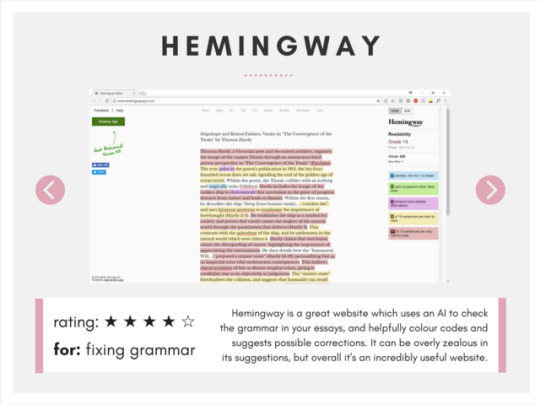

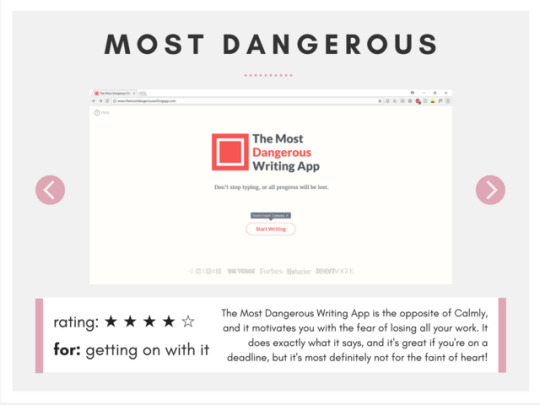
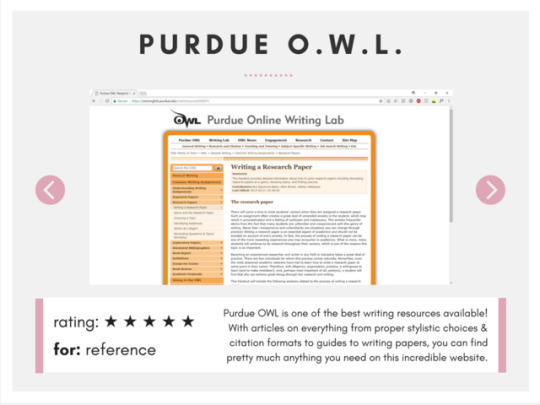

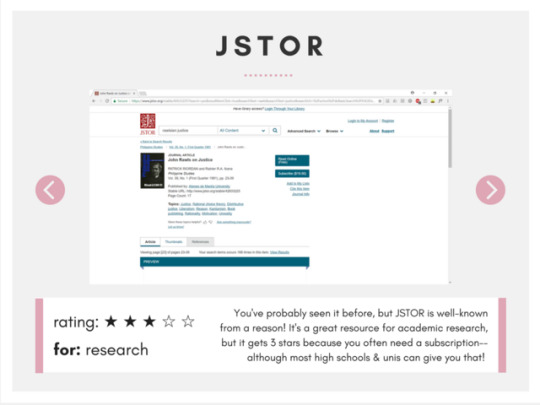

Here’s some weapons for your essay writing arsenal!
Hemingway Editor Calmly Writer The Most Dangerous Writing App Purdue O.W.L. One Look Thesaurus JSTOR Google Scholar
Reply with your favourite or other great websites I didn’t include!
71K notes
·
View notes
Photo

SOME TIPS FOR PAYING FOR COLLEGE WHEN YOU DON’T REALLY HAVE THE MONEY
INTRO: What’s the difference between a scholarship, a grant, and a loan?
A scholarship is something that does not need to be repaid and is usually awarded to you based on academic merit or other accomplishments. Scholarships are either awarded to you personally or to your institution. Depending on the type of scholarship, you can use this money for tuition, books and school supplies, and room and board.
A grant, on the other hand, is usually granted by an organization, the state, or the federal government, and it is usually based on financial need. A grant does not need to be repaid and this money will go directly to your institution.
A loan is given by places such as banks, private companies, or the federal government. As the name suggests, a loan must be repaid and will accrue interest over time. Loans are tricky, and in a minute I will talk about how to best avoid taking on predatory loans.
Keep reading
2K notes
·
View notes
Text
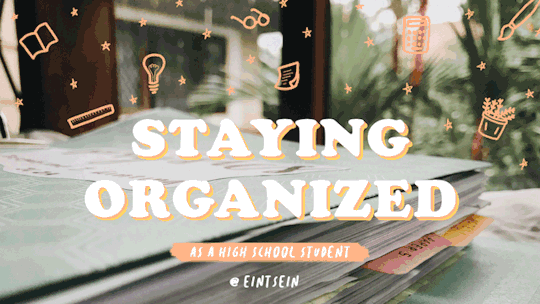
Hey guys, so I’m nearing the end of my senior year, and it’s been great so far! I accomplished my academic tasks efficiently and didn’t burn myself out, and I think the main contributor to my success as a student is my organization system. This system has been refined throughout my high school years, but I think now I’ve finally found the most effective methods.
Please remember that this isn’t the only organization system you can adopt; this is just the one that works the best for me, and I hope that by sharing it with you, you’ll gain a new perspective on how to stay organized as a high school student.

The first thing I wanna talk about is my notebook system, which I briefly mentioned in my Guide to Note-Taking.
My notebook system comprises three types of notebooks: the Everything Notebook, the subject notebook, and the revision notebook.
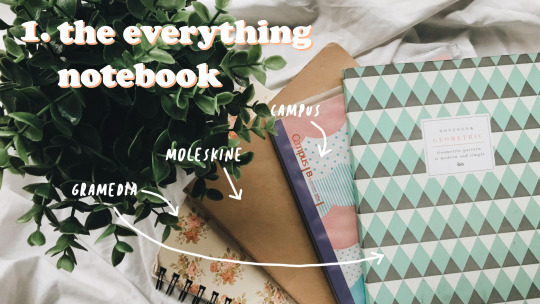
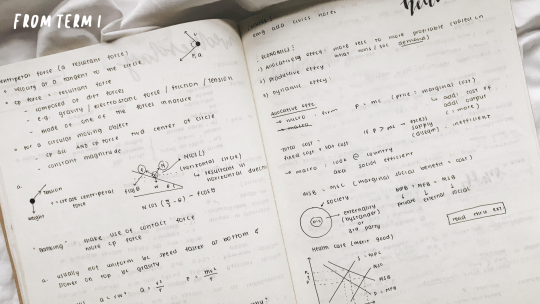
The Everything Notebook
The first stage is in-class notes. I only bring one notebook to school every day. I call it my Everything Notebook, and this is where I write down all of the notes I take in class. This way, I don’t have to lug around six notebooks where I’m only going to use a few pages in each of them that day.
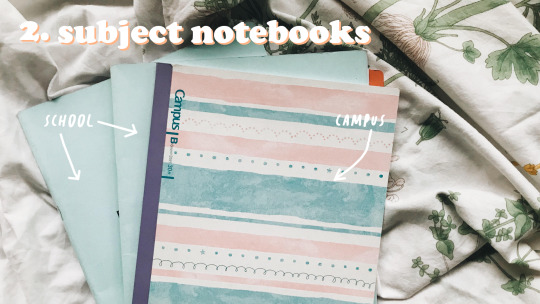
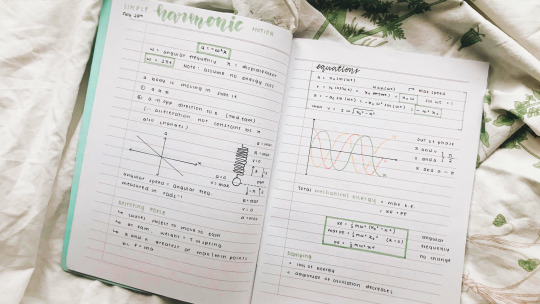
Subject Notebooks
At the end of the day, I would revise my notes and compare them to the syllabus so I know where we are in the learning process. I would then transfer my class notes from my Everything Notebook to my different subject notebooks. This is stage two. I also start to jazz up my notes because I use the notes in my subject notebooks to study for tests.
In addition to my class notes, I include material from my teachers’ notes that they might not have elaborated on, as well as points in the syllabus (I’m currently taking A2) that were only glazed over briefly, or not at all, in some cases. (Note: this does not mean they completely skip a chapter or topic; it’s more like they missed a few bullet points that should be in my notes but aren’t. An example would be if we’re learning about phenol reactions and the teacher forgot to mention the use of FeCl3 as a test for phenol.)
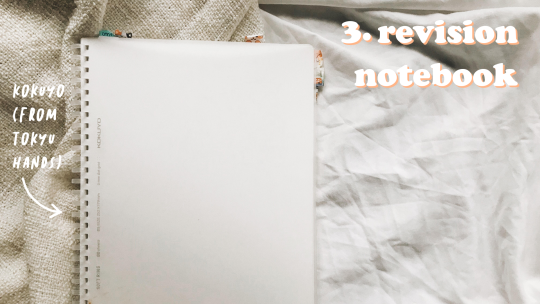
Revision Notebooks
Stage three comes a little later, when exam week is just around the corner. Essentially, I rewrite and improve my notes from my five different subject notebooks into a single revision notebook or binder. (Recently, I’ve opted for a revision notebook because they’re lighter and easier to carry around.)

Because my teachers don’t always teach in the order of the syllabus, the first thing I do is organize my notes according to the syllabus. I would then fill in any other missing gaps in the material that hadn’t been filled in stage two.
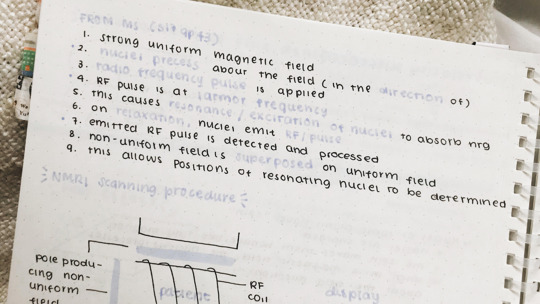
When compiling material for my revision notebook, I use as many sources as possible: my own notes, my teachers’ notes, youtube videos, online sites, and my favorite, the mark scheme! I add in some answers from past papers (explanations only, so no calculations) mainly to secure marks. It’s safer to memorize definitions straight from the mark scheme than from the textbook or from handouts. I also do this to ease my memorization, especially for topics that require lengthy explanations. It’s a lot easier to remember the 6 points I need to explain the principles of NMRI than to remember everything in the four-page handout my teacher gave me.

Folders and binders are essential to organizing your papers. Some people keep a single accordion folder for all their papers, but for me it’s just too heavy to carry around all the time. The same goes for subject folders that are brought to school every day.
Instead, my binder/folder system comprises my Everything Folder and my subject binders.
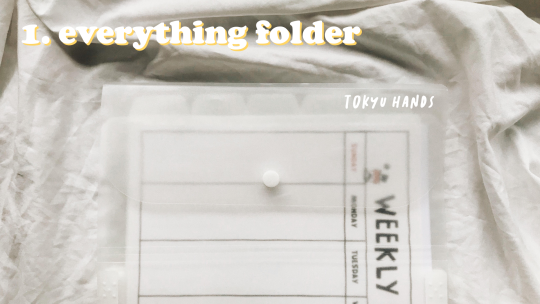
The Everything Folder
The folder I carry with me to school every day is this A4 folder I got from Tokyu Hands. It has 5 pockets, one for each day of the week, so all the papers I receive on Monday will go behind the first divider, and so on.
Some people also keep blank papers in their folders; I don’t because my school has its own lined paper and graphing pads that I keep under my desk that I use if a teacher asks us to do an assignment on those papers. If I do work at home, I prefer to just use a plain A4 paper or a legal pad.

Subject Binders
At the end of the week, I’ll sort my papers into my subject binders. Sometimes I’ll keep some papers in the folder if I think I’ll be needing it the next week. This usually only applies to worksheets because all my teachers’ notes are available on Google Classroom, so I can access them even if I don’t physically have them.
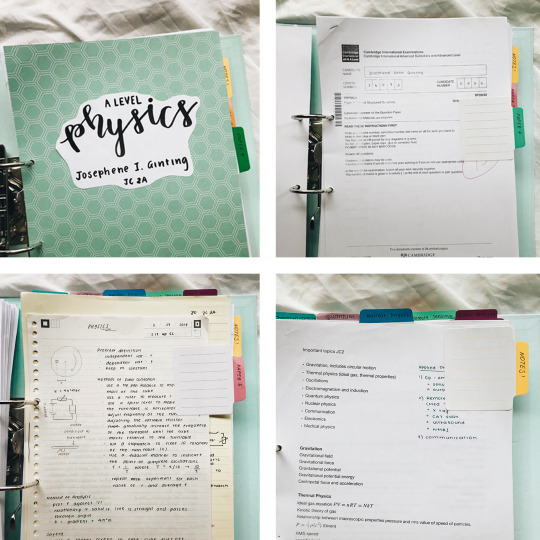
Each of these binders have sections inside them:
Physics: 1 for handouts, notes, and tests, 1 for Paper 4 (Theory), 1 for Paper 5 (Practical Planning). I included extra tabs to mark the different topics in the handouts section.
Chemistry: same as Physics.
Economics: 1 for Paper 3 (MCQ), 1 for Paper 4 (Case Study and Essay). A lot of my Economics material is online, though.
English: 1 for Paper 3 (Text and Discourse analysis), and 2 for Paper 4 (Language Topics, which includes 1 for Child Language Acquisition, 1 for World Englishes). Past papers, handouts, and notes all go under their respective topics.
Mathematics: I just keep everything together because I never revise math and just constantly do past papers.
This makes it easier for me to revise each subject because I can just take one binder with me instead of a messy folder with everything just shoved in there.

I keep a magazine file for each of my A-Level subjects (English and Mathematics are combined). All my textbooks, revision guides, and subject notebooks are kept here, so if I need to revise one subject, that’s the magazine file I’ll take out.

These magazine files prevent any small things (like my book of flashcards) from being shoved to the back of my bookshelf, or materials from different subjects from getting mixed up.

In my senior year, I mostly plan using this app called Edo Agenda. It syncs across all my devices for free and has all the features I need: a to do list to organize tasks, monthly and weekly calendars to organize events, a journal to organize notes and memos.
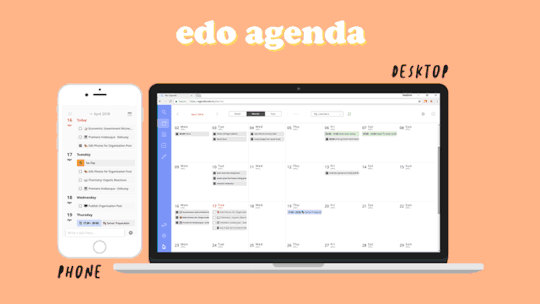
I used to bullet journal regularly, but it takes too much time during weekdays, so now I just bullet journal for the therapeutic effects it gives me, and I use an app for organizing tasks and events. Sometimes at the end of each week, I’ll transfer my tasks to my bullet journal and then decorate the page, but again, this is just for its therapy.

Organizing your school supplies is just as important as organizing your papers and notes. With a more organized backpack and pencil case, you won’t waste time looking for your things at the bottom of an abyss.
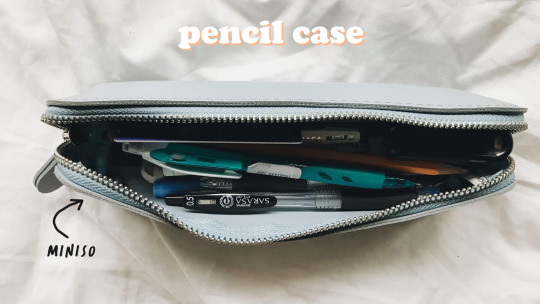
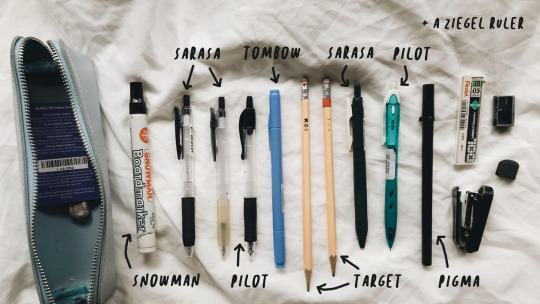
Pencil Case
I don’t find it necessary to bring so much stationery to school unless I plan on making notes at school (usually during revision week).
Backpack
Because we’re already in the revision term, I don’t really carry a lot of things in my everyday backpack, just the following:
Pencil case
Everything Notebook
Everything Folder
Revision notebook
Kindle
Phone
Wallet
Earphones
Calculator
Speaker
Drinking bottle
A pouch with things like a hairbrush, pads, and lip balm
And that’s all for now! I hope this post will help you organize your school life (if you haven’t already) or at least provide some useful insights on some ways to stay organized as a high school student.
45K notes
·
View notes